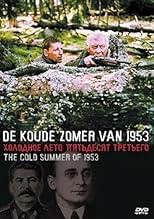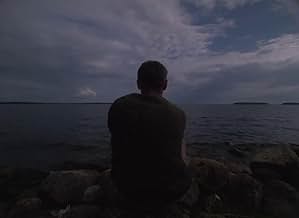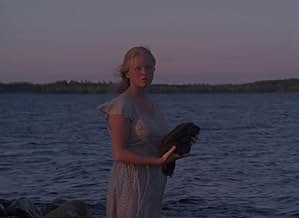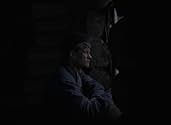Kholodnoe leto pyatdesyat tretego
- 1988
- 1h 41min
VALUTAZIONE IMDb
7,8/10
2766
LA TUA VALUTAZIONE
Aggiungi una trama nella tua linguaFormer political inmates Sergei and Nikolai live as exiles in a remote Siberian village. After the general Soviet gulag amnesty of 1953 8 pardoned common criminals terrorize the inhabitants.Former political inmates Sergei and Nikolai live as exiles in a remote Siberian village. After the general Soviet gulag amnesty of 1953 8 pardoned common criminals terrorize the inhabitants.Former political inmates Sergei and Nikolai live as exiles in a remote Siberian village. After the general Soviet gulag amnesty of 1953 8 pardoned common criminals terrorize the inhabitants.
- Regia
- Sceneggiatura
- Star
- Premi
- 1 vittoria e 2 candidature totali
Sergey Vlasov
- Vitek - bandit
- (as S. Vlasov)
Vladimir Golovin
- 'Baron'
- (as V. Golovin)
Andrey Dudarenko
- Mikhalych - bandit
- (as A. Dudarenko)
Aleksei Kolesnik
- 'Kryuk' - bandit
- (as A.Kolesnik)
Viktor Kosykh
- 'Shurup' - bandit
- (as V.Kosykh)
Boris Plotnikov
- syn Kopalycha
- (as B. Plotnikov)
Elizaveta Solodova
- Starobogatova - zhena Kopalycha
- (as Ye. Solodova)
Konstantin Labutin
- Selyanin
- (as K. Labutin)
Recensioni in evidenza
A violent gang take over a small town where a train carrying gold is shortly due to pass through. The local lawman stands up to them but is killed. Everyone else is too frightened to resist, except for a couple of strangers who everyone else views with suspicion but who have a final shoot out with the gang and save the town.
Sounds familiar? Like a lot of other westerns? Yes, except that the town is in Siberia, the gang are criminals released in an amnesty (prison bosses took the opportunity to relieve themselves of the prisoners who caused the most trouble) and the strangers in town are political exiles from Moscow.
It's well executed and entertaining, even with subtitles. It proves that certain ideas cross cultural boundaries.
Sounds familiar? Like a lot of other westerns? Yes, except that the town is in Siberia, the gang are criminals released in an amnesty (prison bosses took the opportunity to relieve themselves of the prisoners who caused the most trouble) and the strangers in town are political exiles from Moscow.
It's well executed and entertaining, even with subtitles. It proves that certain ideas cross cultural boundaries.
Many said in their comments that this movie is sort of an action movie about good guys shooting bad guys. To me, this perception totally misses the idea of the movie. This film is absolutely not about shooting and action, even though there is plenty of it. It is about many things. It is about physical and more importantly deep psychological suffering of people who lived in exile during Stalin/Soviet repressions.
This film shows in a dramatic way lives of two people and their families being ruined buy the System. The film portrays two examples (out of millions) of one person who's gone through pain of World War II and one of a dedicated scientists who found themselves been thrown to a jail and their hopes broken at times when they were at their peak in life. Then they found themselves existing for many long and cold years in Siberian exile watching their lives slipping away from them.
Another important point of the film is showing the entire generations of people (with very few exceptions) being brainwashed and molded the way that state wanted them to be. At the same time the cynical nature of the system itself is also portrayed in many neat and subtle ways.
This film is like a book were you need to read between the lines, here you need to see behind the image. To me, being grown up in Soviet Union - it comes naturally in this case and the film grips me with its drama for its entire length having a very moving ending. But probably if you are not fluent in CCCP history and you don't know for example who Beria was, what the laws were like during cult of personality, what was the Belarussian front in World War II, who was Ordzhonikidze - without such little things and many others the film will be either very hard to follow (in this case it probably becomes sort of pretentious art house stile flick) or you just miss it completely and it is going to be just an aged action movie. Well watch it if you can, but it is 9 out of 10 from me.
This film shows in a dramatic way lives of two people and their families being ruined buy the System. The film portrays two examples (out of millions) of one person who's gone through pain of World War II and one of a dedicated scientists who found themselves been thrown to a jail and their hopes broken at times when they were at their peak in life. Then they found themselves existing for many long and cold years in Siberian exile watching their lives slipping away from them.
Another important point of the film is showing the entire generations of people (with very few exceptions) being brainwashed and molded the way that state wanted them to be. At the same time the cynical nature of the system itself is also portrayed in many neat and subtle ways.
This film is like a book were you need to read between the lines, here you need to see behind the image. To me, being grown up in Soviet Union - it comes naturally in this case and the film grips me with its drama for its entire length having a very moving ending. But probably if you are not fluent in CCCP history and you don't know for example who Beria was, what the laws were like during cult of personality, what was the Belarussian front in World War II, who was Ordzhonikidze - without such little things and many others the film will be either very hard to follow (in this case it probably becomes sort of pretentious art house stile flick) or you just miss it completely and it is going to be just an aged action movie. Well watch it if you can, but it is 9 out of 10 from me.
Grainy stock gives this film an almost documentary feel and has the additional effect of underscoring the dismal state of the trading outpost at which most of the events take place. _The Cold Summer of 1953_ is more authentic and less hysterical than _Gulag_, although it makes the same points with regards the social standing (or, more accurately, the complete lack of social standing) of political prisoners in postwar Russia. Looked down upon by even the most violent of criminals, the two political exiles still maintain a sense of dignity and, to some extent, honour, in the face of their privations.
Generally, amnesty is provided to prisoners on humanitarian grounds in order to initiate reform process. However, there are instances when an offer of amnesty is misused by certain prisoners. Director Alexander Proshkin's Russian film "The cold summer of 1953" chronicles how some escaped convicts misuse amnesty provided to them to terrorize innocent villagers. Based on a series of true events which have a lot of historical significance for Russian people, Proshkin's film faithfully describes how the clash of ideologies continue to have a massive impact on the destinies of ordinary people. In the case of this film, Soviet leader Stalin's death enabled Beria to proclaim amnesty for hardened criminals, a group of people who were deemed as 'enemy of the state'. For a film which has a steady balance of action, drama and thriller, it is surprising to note that some space was also kept for portraying the innocence of ordinary people who were determined to continue with their ordinary lives. This quality would surely appeal to all viewers who might like to explore new facets of this film.
One of the best Soviet movies. A must see along with reading Solzhenitsyn's books.
Lo sapevi?
- QuizThe role in this film, unfortunately, was the last for the brilliant and beloved actor Anatoliy Papanov.
I più visti
Accedi per valutare e creare un elenco di titoli salvati per ottenere consigli personalizzati
- How long is The Cold Summer of 1953?Powered by Alexa
Dettagli
Contribuisci a questa pagina
Suggerisci una modifica o aggiungi i contenuti mancanti




































